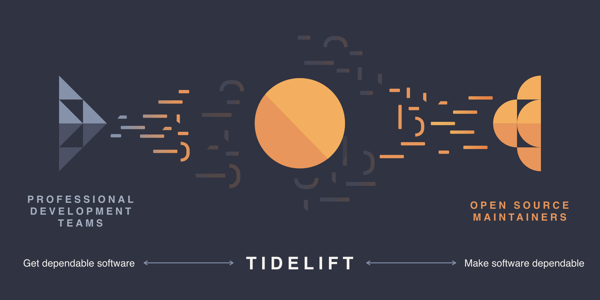Today we’re announcing Tidelift’s Series A financing, co-led by General Catalyst, Foundry Group, and Matthew Szulik, former Chairman and CEO of Red Hat.
We’re excited to work with these experienced partners on our mission to make open source work better—for everyone.
Here is some context on where we are coming from, and where we’re headed next.
Open source sustainability is not enough
In discussions about rewarding open source maintainers for their contributions, the conversation is often framed in terms of sustainability.
The word sustainability brings to mind the idea of barely getting by. How can we help these open source heroes pay their bills? How do we keep them from the precipice of burnout? Can we help them eke out a subsistence-level survival strategy that allows them to keep doing the work that they love, and that we all benefit from?
Open source sustainability is a noble goal—who would stand in the way of these creators and maintainers, who invest so much of their time and effort in our shared digital infrastructure, trying to make ends meet?
But basic survivability? Let’s set the bar higher than that.
Way higher.
If we do, it will be great for users of open source, just as much as it is for creators. Here's why.
Value that scales with users, not creators
The open source maintainers who create the software roads and bridges we depend on deserve better outcomes than ramen noodle-level profitability. After all, professional software teams are getting richly rewarded for the applications they build leveraging open source components. Why shouldn’t the open source creators and maintainers whose software goes into those applications be rewarded as well?
We see an opportunity at the heart of this dilemma: a new system where open source maintainers are rewarded in proportion to the value created through the use of their software. Common open source business models like consulting, bug bounties, and contract software development fail this basic test because they scale with the number of creators involved, not with the use of the software.
We founded Tidelift with the goal of introducing a new spin on existing open source business models, one that improves on the status quo for both creators and professional users of open source. Our proposal is straightforward.
An open source business plan that lifts all boats
Modern software applications are largely built out of open source components—in fact, 92% of applications contain open source libraries.
For the software teams building those applications, Tidelift is a source of vital professional-grade support and maintenance for the open source packages and libraries they already use. Professional software teams can’t just grab some open source code and hope for the best, and too often that’s what they’re doing today—exposing them to potential security, intellectual property, and maintenance challenges that can offset the amazing upside value of building on open source. The Tidelift Subscription backs these teams up with security, licensing, and maintenance assurances spanning the most popular programming languages, package managers, and open source communities.
For the maintainers creating those open source components, Tidelift is a business partner, aggregating demand from professional teams, managing subscriptions, and providing tools for maintainers to get paid for providing those same security, legal, and maintenance assurances at the individual package level.
By coordinating and matching this supply and demand, Tidelift enables an exchange of value that wasn’t possible before. It’s not feasible for every professional software team to negotiate a direct pairwise commercial relationship with every open source maintainer whose software they use. By mediating these relationships through a common platform, Tidelift makes it possible for this model to scale.

Something old, something new
The value proposition for Tidelift subscribers isn’t entirely new—it echos the familiar model of Red Hat Enterprise Linux, the Cloudera distribution of Hadoop, and other open source businesses that have come before. But Tidelift is extending that value to all of open source. Think of Tidelift as subscribing to Netflix for professional open source support.
The opportunity for open source maintainers, on the other hand, is pretty different from the status quo. Instead of facing the choice between toiling only for indirect rewards or scratching out a living by selling their time, Tidelift presents a new, pragmatic, and scalable business model. In exchange for maintaining their software according to best practices, participating maintainers (we call them “lifters”) get a reliable stream of income. And that income isn’t capped by the hours they can work because it instead scales in proportion to the value they create—and there is no ceiling.
So open source maintainers don’t just have the opportunity to survive—they have the opportunity to thrive.
And that's better for everyone: the open source creators who are richly rewarded for their contributions, as well as the professional software teams using their software who get all the assurances they need to deploy with confidence.
Where we go from here
Over the last several months, we’ve been having a lot of conversations with users and creators of open source. We’ve studied where open source is used (tl;dr: everywhere!), examined what open source users care about, learned how professional open source users evaluate their software, discovered that 83% of them would pay for additional assurances around the open source they use, and investigated how open source has traditionally been funded.
We also introduced the Tidelift Subscription.
With our new funding, and new partners, we’re excited to take Tidelift to the next level: providing better open source building blocks for more professional software teams, and providing a better business model for more open source creators. That’s the Tidelift win-win.
Let’s set the bar higher, and shift the conversation about open source from sustainability to abundance.
If you’d like to learn more, check out these resources:
- If you are part of a professional software development team, download our free definitive guide to professional open source
- If you are an open source maintainer, download our Tidelift lifter guide: an open source business plan that lifts all boats
- Sign up to receive updates and follow us on Twitter.



 50 Milk St, 16th Floor, Boston, MA 02109
50 Milk St, 16th Floor, Boston, MA 02109